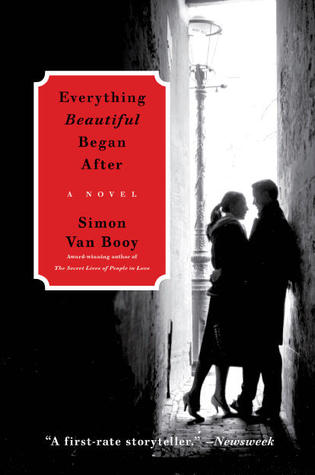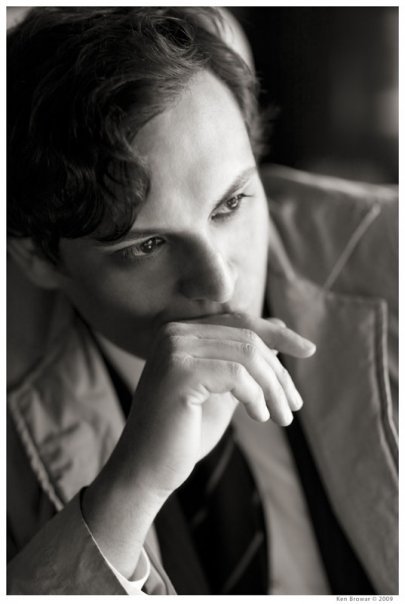
The strangest thing about meeting Simon Van Booy is that it doesn't feel strange at all.
Many people might call Simon's new novel, Everything Beautiful Began After, a love triangle. But really, it's more of a love octagon. Instead of 3-D, it's 8-D, and it exists on many different planes.
Reading this book, the language is so beautiful and potent that you want to go slowly, savoring every word like a mouthful of the most delectable soufflé, but at the same time the momentum and passion of the story gallop ahead of you, taking you on an incredible ride, leaving you gasping, breathless, and barely able to hold onto your reigns... or spoon.
I first met Simon just over two years ago, but not in person. I had read a piece in the Modern Love section of The New York Times that had touched me very deeply. An Englishman, a writer, had been left with his four year-old daughter after the very sudden death of his wife. His story was about trying to become everything to his daughter, to make her feel safe, in a very unsafe world.
My father, my world to me as a little girl, had died very suddenly when I was six.
I wrote to "Simon" right away, figuring I would be able to find him through some modern social networking site, telling him that I thought he was doing beautifully for his daughter. I could picture him: A grey-haired, fifty-ish, slim father, with faint laugh-lines around his eyes. With this image in mind, I put the author's name into the facebook search engine. An image quickly appeared and then I froze. A young, English and literary Johnny Depp, who looked to be exactly my age with dark glasses and a waist-coat looked back at me.
And my immediate thought was, 'I can never send this message.' But then I thought to myself that I was being ridiculous. Young and beautiful people need compassion as much as everyone else, maybe more, because no one else thinks they need it.
Almost halfway through June, I receive a tweet from Simon -- 140 characters or less, inviting me to a reading of his at the Soho House in LA. Firstly, I am amazed that he remembers that my husband and I live in LA from a long-defunct facebook message, (he has since become so successful that he now has a "page") and secondly I am extremely nervous to meet him in person. He and his daughter have slowly taken on a second life in my mind. I look in on them occasionally, and see them, almost like ageless Sims characters from the life-simulation computer game: staring at goldfish, sewing buttons on clothes and walking hand in hand through the tree-lined streets of New York.
By some remarkable coincidence, Simon and I finally meet on Father's Day. From the time that he silently hands me a program after I arrive breathless and late, with a balloon he has drawn on his picture from the program saying, "Hello, Cynthia" to the time we shake hands after agreeing to meet the next day, I am astonished. He is everything he has always said he is.
He sits in the garden of the Chateau Marmont, waiting for me, writing, of course. Jacket, and pressed shirt, polka dot handkerchief, sprayed with a Dior scent only available in Paris. Off come his ray-bans (black lenses replaced with brown) and back are last night's beautiful tortoise-shell glasses. He is wearing only one antique-looking cufflink, engraved beautifully, from a past love.
He stands to greet me and kisses both my cheeks. From then on, whenever I leave the table, he stands. Having grown up in New York City, occasionally I think he's about to join me, wherever I'm going, and then I realize that he has the most exquisite case of manners I've ever seen.
He seems entirely otherworldly. When he speaks of missing the seventies, people say, "Yeah, the 1970's, great time, man." And Simon will tilt his head and say, "I mean the 1770's." He even becomes queasy sitting in the back of cars. It's as though his body is not meant for modern transportational means.
We ask for water, it is warm in June, and I ask for a glass without ice. Over the course of the visit, my glass is refilled, ice-cubes and all. Simon takes his spoon and removes all of the ice from my glass into his own. With this one action, he endears himself to me for life.
When Harper Perennial sends me Everything Beautiful Began After, two weeks later, I recognize so much of its content and feeling from our afternoon together. Whole lines jump out at me, fully imbued with the character of their author.
 Everything Beautiful Began After by Simon Van Booy. Published by Harper Perennial.
Everything Beautiful Began After by Simon Van Booy. Published by Harper Perennial.
"You will appreciate tiny things -- and step with the confidence of someone overjoyed to know he is doomed." Simon sees beginnings and possibilities in everything. At one point, he even notices an un-hatched egg in the Chateau foliage. Nothing is lost on him; he sees all sights, scents, and textures.
The one word that resonates in my head after meeting Simon is: Hope. Due to our mutual losses, his youth and his hopefulness surprise me. "No one will know that you're really an old man, a ruined man, with a sadness so deep it's like an unbeatable strength." I had half-expected the two of us to attend lunch, already octogenarians!
"The ability to love Athens, like all love, lies not in the city, but in the visitor." Simon absolutely loves people, all people, and finds them fascinating. They, in turn, automatically tell him everything there is to know about themselves. This happens with our first waiter, ('Why are you wearing a band-aid?' Simon asks coyly) and then our second waiter, and finally his lunch companion.
After our very intense connection two years ago over loss, it is impossible to know how we will sit together now. "Rebecca's life was the history of missing people." Usually, when you meet someone for the first time, you play yourself, or a version of yourself that you know well, always holding one hand in protection of your chest. A very strange and beautiful thing happens during this meeting in the garden; we both slowly put our hands down.
At one point in the novel, a blind girl is able to perfectly represent, after having only brushed by it briefly, a hand she has touched. Using only tiny drawn lines, she shows the hand's lines, scars and nuances. Simon's writing does that. In telling you intimate things about someone else, he is making a perfect sketch of you. Your pain, embarrassments, and your joys. Things you knew, things you didn't know, and things you were only vaguely aware of.
"You don't know which is worse, the shock of what happened or the ache of what never will." The book is about the strength in tragedy, the beauty in tragedy, and how, when we think and feel for certain that there can never be love again, there it is.
There is that old saying, "Life is uncertain, order dessert first." And so we do, coffee and chocolate gelato for him, raspberry and blueberry sorbet for me.
They are music for the mouth.
For Rebecca, the heroine of our story, "Her dream was to become an artist -- to be loved for moments beyond her own life." Simon has already won the Frank O'Connor Award, the largest short story award that exists, but he attained has something far more important. Simon will be loved for many moments beyond his own life.
In the novel, there is a description of Greek statues. The faces are not detailed, because in Greece they understand that one person's experience is everyone's experience. "We all sit down to the same meal at different times." Simon's words about loss are specific and universal at the same time. Of those whose faces we long to see again, "A face is a memory one cannot will in its entirety."
Except for the inclusion of cell phones and a professor's recalling certain years as they pertain to his car odometer, most of this novel could take place in any time, ancient to present. There are faxes, but they are communicating wonderful handwritten letters on stationary from all over the world. This all changes when our hero is faced with a modern vehicle. There are passages, a dialogue, as it were, between a man and his car that are hilarious and strangely romantic. It is as if, with a literal kiss to the GPS speaking to him in the wrong language, Simon Van Booy has begun to make his peace with having to live in this century.
"You must also learn to accept that death is the most sophisticated form of beauty, and the most difficult to accept." Simon tells me that he has on him a letter to his father, for Father's Day, saying all of the things he never said. Having spent a life-time writing letters to someone who can never read them, I tell him how important it is to say these things while we still have the chance.
We never know how long we have with the people we love, only that by necessity, it will never be long enough. He is missing a stamp, so he hands it to me to mail to England for him. As I return home, I feel that I am carrying the most precious and important envelope in existence. And for many days, even after I place the letter in the mailbox at the end of our dusty road, I dream about all of the different messages the envelope might still contain.
Everything Beautiful Began After, Released July 5th, by Harper Perrenial:
Everything Beautiful Began After, Kindle Edition.
